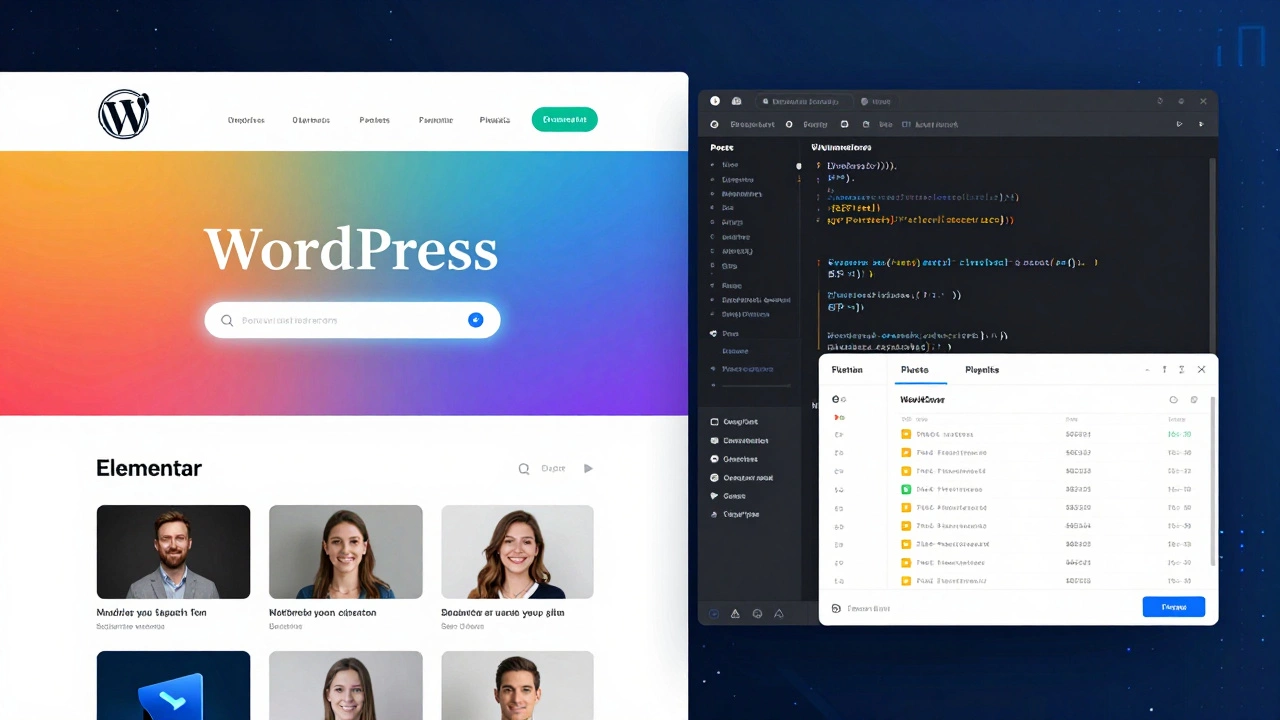Alright, so you're thinking about diving into WordPress development in 2024, and you're probably wondering if PHP is worth your time. Let's face it, PHP's been around for a while, and yes, it can feel like the 'old guy' in the room when compared to some of the flashier languages out there. But here's the thing: WordPress powers over 40% of websites on the internet, and guess what? It's built on PHP. So, if you're looking to become a WordPress pro, PHP isn't just useful—it's pretty essential.
Now, you might've heard whispers that PHP is outdated or being replaced, but don't buy into all that chatter just yet. The truth is, PHP keeps evolving with regular updates to improve speed and security. In fact, PHP 8.2 came out recently, smoothing out some wrinkles and adding a bunch of cool features. It's like PHP is keeping up with the times, just like your grandpa who recently got hooked on TikTok.
- Why PHP Still Holds Ground in 2024
- The Significance of PHP in WordPress
- Benefits of Learning PHP for WordPress
- Tips for Getting Started with PHP
Why PHP Still Holds Ground in 2024
So, let's talk about why PHP is still kicking around in 2024 and why it's more relevant than you'd think for those jumping into WordPress development. First off, its sheer ubiquity. PHP has been the engine driving WordPress since its inception, and since WordPress powers over 40% of all websites, PHP's not going anywhere anytime soon.
One major reason PHP is still a top contender is its continued evolution. The latest version, PHP 8.2, brings improvements in speed and security, and constant updates mean it's adapting to modern needs. It keeps the codebase robust and secure, using features like Just-In-Time Compilation for better performance, which is a big deal for web developers.
PHP is also incredibly accessible. Whether you're a total newbie or a seasoned coder, you can get up and running with PHP pretty swiftly. It doesn’t hurt that PHP has a massive support community that contributes to a wealth of resources, libraries, and frameworks. Having a thriving community means that help is always just a forum post away, making learning PHP less of a solo journey.
And let's not forget about flexibility. PHP shines with its compatibility. It works seamlessly with all major operating systems and servers, making it a versatile choice for developers looking to create a variety of websites and apps without worrying about interoperability.
Here's a quick snapshot of PHP's impressive stats:
| PHP Version | Release Date | Major Improvements |
|---|---|---|
| 8.0 | Nov 2020 | JIT Compiler, Union Types |
| 8.1 | Nov 2021 | Enums, Fibers, Performance Improvements |
| 8.2 | Dec 2022 | Read-Only Classes, Disjoint Unions |
So there you have it. PHP's not just holding its ground; it's winning the race for those interested in WordPress development. Its evolving nature, wide adoption, and strong community support make it a savvy choice for anyone looking to get serious about crafting dynamic, powerful sites.
The Significance of PHP in WordPress
When it comes to WordPress, PHP isn't just another language in the toolkit—it's the backbone of the entire platform. Every page, post, and plug-in you've ever seen on a WordPress site runs on PHP. It's like the Lego bricks of WordPress, piecing everything together behind the scenes. So, understanding PHP is like holding the key to WordPress’s magic kingdom.
Why's PHP so crucial? First off, it handles the server-side scripting. That means whenever someone visits a WordPress site, PHP springs into action, fetching data from the database and piecing together the pages you see. This all happens super fast to ensure users have a smooth experience. On top of that, WordPress’s core files, themes, and most plugins are written in PHP. So if you want to customize or create your own themes and plugins, you'll need to get comfy with PHP.
Now, it's not just about the code; it's about staying relevant. WordPress has been integrating more advanced PHP features in its updates to boost performance and security. Imagine you're building plugins or themes: using the latest PHP capabilities can make them faster and more secure, which users love.
Earlier WordPress versions were built on older PHP versions, but with constant updates, newer versions require at least PHP 7.4, and many recommend PHP 8 or later for enhanced features and security. Check out this small comparison between two PHP versions:
| PHP Version | Performance | Security Features |
|---|---|---|
| PHP 7.4 | Improved performance over older versions | Standard security patches |
| PHP 8 | 30% faster execution time | Enhanced security features |
In short, learning PHP isn't just helpful for WordPress development—it's essential if you want to make the most out of what WordPress can offer. It's all about diving into what makes WordPress tick and making your mark in the vast world of web development.

Benefits of Learning PHP for WordPress
So, let's dig into why getting friendly with PHP is a smart move if you're diving into WordPress development. First off, having PHP skills under your belt means you can customize WordPress themes and plugins like a pro. Imagine being able to tweak any feature or fix a pesky bug yourself without waiting around for a support desk to help out!
One of the biggest perks? PHP isn't just a WordPress thing. It's a web development staple, which means that by learning it, you're also laying down the groundwork to tackle other CMSs or frameworks—talk about killing two birds with one stone!
Another benefit of learning PHP is its strong community and rich resource pool. Need help or stuck on a problem? There are endless forums, tutorials, and open-source projects you can dig into. You don't have to feel like you're floating in the middle of a coding ocean without a life raft.
Here's a handy list of why PHP is great:
- PHP is open-source, meaning no annoying licensing fees.
- PHP evolves with regular updates, keeping its technology fresh and useful.
- Learning PHP gives you access to a vibrant community full of tips, tricks, and support.
Let's not forget about WordPress' massive market share. With so many sites relying on it, there's a huge demand for developers who can navigate PHP like a champ. This means you not only upgrade your technical skills but also up your earning potential. Who doesn't like getting more bang for their buck, right?
Tips for Getting Started with PHP
Jumping into learning PHP can feel a bit overwhelming if you're just starting out, but don't sweat it. You can totally master it over time. Here are some foolproof tips to kickstart your journey and get you coding confidently for WordPress development in no time.
- Start with the Basics: Dive into the core syntax, variables, and data types. Understanding fundamentals like loops, conditional statements, and functions are crucial. Websites like w3schools.com offer free PHP tutorials where you can practice.
- Set Up Your Environment: Make sure to set up a local server environment using software like XAMPP or MAMP. These tools simulate a server on your computer so you can test your PHP scripts.
- Dive into WordPress Specific PHP: Since you're interested in WordPress, focus on understanding how PHP ties into its structure. Learn about the WordPress loop, hooks, and functions. These are the backbone of any WordPress development project.
- Utilize Online Resources: Platforms like Codecademy or Udemy offer structured PHP courses that dive deeper into specific areas, including WordPress-centric PHP. These courses help reinforce what you learn.
- Join the Community: PHP has a huge community! Check out online forums and groups where you can ask questions. Websites like Stack Overflow and the WordPress support forums are a lifeline when you get stuck.
- Build Projects: The best way to learn is by doing. Start by creating small scripts or plugins for WordPress. As you gain confidence, try more challenging projects to stretch your skills.
And hey, don't forget, PHP is like learning how to ride a bike. You'll have your ups and downs, but once you get the hang of it, you're all set to create amazing things with WordPress!


